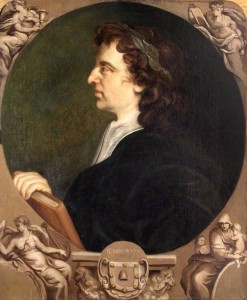
John Milton was born to John and Sara Milton on the ninth of December in 1608 in London, England. His early education began with private tutors, with whom he studied Latin, Greek, Hebrew, French, and Italian. Sometime between the years 1615 and 1621, Milton entered into his studies at Saint Paul’s and, in 1625, he enrolled at Cambridge. He completed his Bachelor’s degree in 1629 and began working toward his Master’s degree in October of the same year. Milton moved with his family to Hammersmith in 1631, studying privately to, as he claimed, fill in the gaps left by his education at Cambridge. Among Milton’s instructors were Alexander Gil the Elder at St. Paul’s and William Chappell at Christ’s College.
In 1642, Milton married Mary Powell. Their nuptials were short-lived, and Mary returned to live with her parents after only a few weeks. The reason for their separation is unknown, but during this time Milton composed The doctrine and discipline of divorce, restored to the good of both sexes from the bondage of canon law and other mistakes to Christian freedom. In it, Milton argued that a man should be permitted to divorce his wife when the marriage ceased to be spiritually or emotionally productive. The couple eventually reconciled, and Mary bore four children: Anne, Mary, John, and Deborah. After Mary died in 1652, Milton remarried Katherine Woodcock, who died in 1658. When he died, Milton left all of his possessions to his final wife, Elizabeth Mynshull.
Milton’s reputation as a polemicist increased during the years of his separation from Mary, with his Doctrine and discipline of divorce. In the 1640s, Milton also worked as a schoolmaster, dividing his work between teaching and polemical debate. Attempts to censor later tracts on divorce may have led to Milton to compose his Aeropagetica. Milton wrote Aeropagetica, published in November of 1644, as a late response to the licensing order of June 1643. During the trial of Charles I in 1649, Milton composed Tenure of Kings and Magistrates, which argued the lawfulness of “any who have power to call to account a Tyrant or a wicked King and after due conviction, to despose, and put him to death.” Fourteen days after the execution of Charles I, Milton’s Tenure of Kings and Magistrates was printed. The publication of this tract initiated Milton’s time in public service from 1649 until 1655.
With the restoration of Charles II in May of 1660, Milton’s necessarily went into hiding. That June, orders were made for Milton’s arrest. In August, a proclamation was issued for the public burning of all Milton’s books. Milton came out of hiding after the Act of Free and General Pardon, but was subsequently arrested and imprisoned in the Tower that autumn. He was eventually released, narrowly escaping execution, but was expected to pay a hefty fee for his imprisonment. He contested the bill and Andrew Marvell defended him in court, but whether or not this had much affect on the outcome is unknown.
Milton’s imprisonment interrupted his composition of Paradise Lost, which originated as a tragedy. Paradise Lost transformed into the epic we know it as today sometime between the years of 1658 and 1663. Milton’s perspective had changed significantly after his time in hiding and in the Tower, and much of his epic poem reflects his shift in worldview as well as his total blindness, which occurred in 1652. After publishing the second edition of Paradise Lost in 1674, Milton composed his will, bequeathing everything he had left to his third wife. He died in November of 1674 from renal failure.
Amanda Fowler
Works Cited
Gordon Campbell, ‘Milton, John (1608–1674)’, Oxford Dictionary of National Biography, Oxford University Press, 2004; online edn, Jan 2009.